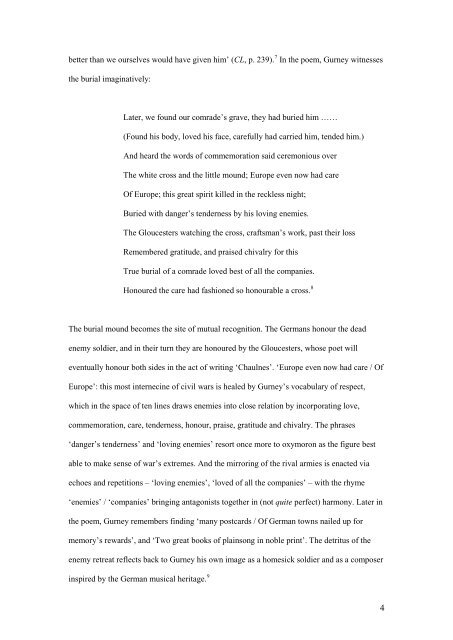Gurney and Fritz.pdf - Exeter Research and Institutional Content ...
Gurney and Fritz.pdf - Exeter Research and Institutional Content ...
Gurney and Fritz.pdf - Exeter Research and Institutional Content ...
Create successful ePaper yourself
Turn your PDF publications into a flip-book with our unique Google optimized e-Paper software.
etter than we ourselves would have given him’ (CL, p. 239). 7 In the poem, <strong>Gurney</strong> witnesses<br />
the burial imaginatively:<br />
Later, we found our comrade’s grave, they had buried him ……<br />
(Found his body, loved his face, carefully had carried him, tended him.)<br />
And heard the words of commemoration said ceremonious over<br />
The white cross <strong>and</strong> the little mound; Europe even now had care<br />
Of Europe; this great spirit killed in the reckless night;<br />
Buried with danger’s tenderness by his loving enemies.<br />
The Gloucesters watching the cross, craftsman’s work, past their loss<br />
Remembered gratitude, <strong>and</strong> praised chivalry for this<br />
True burial of a comrade loved best of all the companies.<br />
Honoured the care had fashioned so honourable a cross. 8<br />
The burial mound becomes the site of mutual recognition. The Germans honour the dead<br />
enemy soldier, <strong>and</strong> in their turn they are honoured by the Gloucesters, whose poet will<br />
eventually honour both sides in the act of writing ‘Chaulnes’. ‘Europe even now had care / Of<br />
Europe’: this most internecine of civil wars is healed by <strong>Gurney</strong>’s vocabulary of respect,<br />
which in the space of ten lines draws enemies into close relation by incorporating love,<br />
commemoration, care, tenderness, honour, praise, gratitude <strong>and</strong> chivalry. The phrases<br />
‘danger’s tenderness’ <strong>and</strong> ‘loving enemies’ resort once more to oxymoron as the figure best<br />
able to make sense of war’s extremes. And the mirroring of the rival armies is enacted via<br />
echoes <strong>and</strong> repetitions – ‘loving enemies’, ‘loved of all the companies’ – with the rhyme<br />
‘enemies’ / ‘companies’ bringing antagonists together in (not quite perfect) harmony. Later in<br />
the poem, <strong>Gurney</strong> remembers finding ‘many postcards / Of German towns nailed up for<br />
memory’s rewards’, <strong>and</strong> ‘Two great books of plainsong in noble print’. The detritus of the<br />
enemy retreat reflects back to <strong>Gurney</strong> his own image as a homesick soldier <strong>and</strong> as a composer<br />
inspired by the German musical heritage. 9<br />
4
















